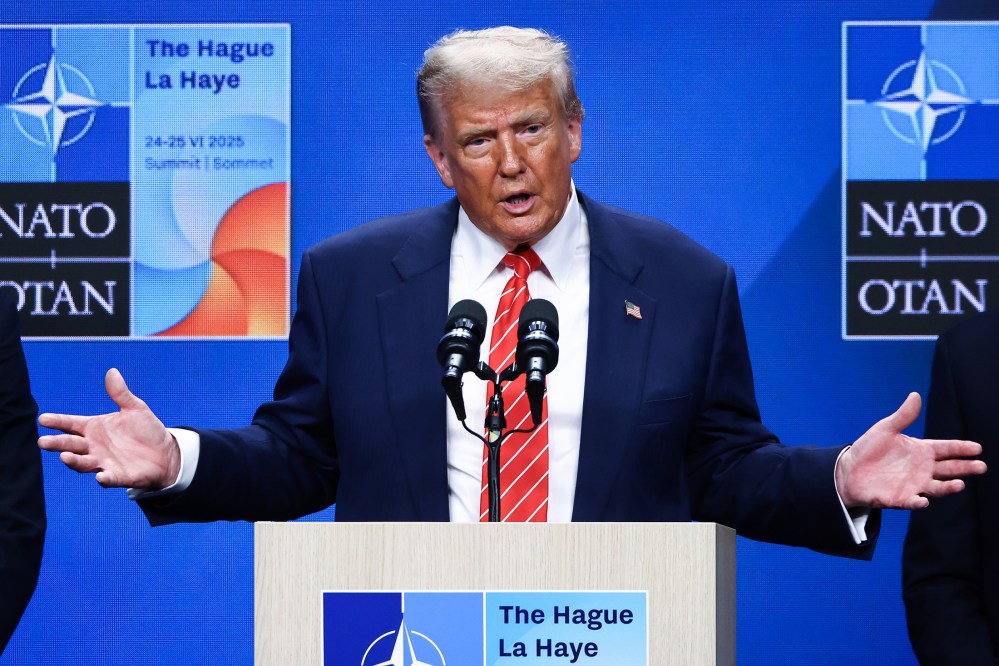American national security officials have met in this idyllic mountain retreat in Colorado each July for the last 15 years to talk openly about the biggest threats facing the world. But this year’s Aspen Security Forum at times seemed to take place in a parallel universe where Donald Trump isn’t president.
In the past, interviews and off-the-record chats here made headlines around the world for their insight into what the people running the U.S. government were thinking about threats to national security.
But Trump’s team boycotted the conference this year. And some of the former officials and experts who did attend seemed to downplay the dramatic changes that the Trump administration has already made to foreign policy, a sign that either some of the nation’s top experts haven’t grappled with the new world order he is attempting to build — or they are afraid to speak openly about it.
Those who might have been able to explain what the president is thinking were nowhere to be seen.
Those who might have been able to explain what the president is thinking were nowhere to be seen.
Very few Trump administration officials agreed to attend, and most of those who did — largely military leaders — abruptly canceled on the eve of the conference. The Pentagon ordered them not to appear, saying the forum “promotes the evil of globalism, disdain for our great country and hatred for the president of the United States.”
That charge is not only demonstrably false but deeply ironic, because even before the cancellations, one could argue that some of the panel discussions in Aspen this year seemed calibrated to tread lightly around the historic changes Trump is making to American foreign and trade policy — even though those changes run contrary to values many attendees have been espousing their whole careers.

Major Trump initiatives with implications for U.S. national security — such as diverting FBI agents to immigration enforcement and refocusing counterterrorism efforts toward Latin American gangs — were not mentioned. Neither were serious developments, such as the exodus of national security experts from the intelligence community, the FBI and the State Department.
Some speakers seemed determined to avoid criticizing the president and his policies, even when Trump’s handling of an issue directly contradicted their long-stated views.
Some of this was the fruit of good intentions — the Aspen Security Forum has always taken pains to be a safe space for both parties. In fact, several senior officials in the first Trump administration trekked to Aspen to appear in panel discussions, including the CIA director, the FBI director and two homeland security secretaries.
But things have changed. The Trump administration is not only declining to engage with perceived opponents, it’s using the levers of power to punish them, from law firms to universities to individuals. More than one Aspen Security Forum attendee admitted off the record that there was widespread concern that speaking out against Trump could hurt their business or professional interests.
The result was a meetup that on occasion seemed airily disconnected from the Trump administration’s actions and policies.
You might have expected some of the speakers to denounce Trump’s historic slashing of foreign aid.
Consider foreign aid. Speakers at the Aspen Security Forum have long touted the benefits of American soft power, especially foreign assistance. So you might have expected some of them to denounce Trump’s historic slashing of the U.S. Agency for International Development, which one study projected could cost 14 million lives by 2030.
But a panel examining the subject was given the milquetoast title, “The Weight of the World: International Aid and Trade.” The moderator, Dafna Linzer of U.S. News and World Report, introduced the subject by asking former USAID Director Henrietta Holsman Fore: “There’s a lot of changes under President Trump in aid and trade, challenges and opportunities — how are you seeing the field?”
Fore was briefly direct, referring to the Trump cuts as a “typhoon that has come through our ecosystem,” but she quickly moved on. The important thing, she said, is to look forward: “What do we do now?”
As she was talking about the potential for artificial intelligence and quantum computing to make foreign aid more efficient, The Atlantic reported that the U.S. government had decided to incinerate nearly 500 tons of food aid that had expired before it could be distributed.













